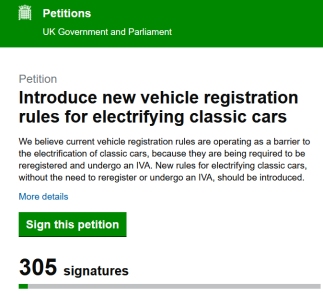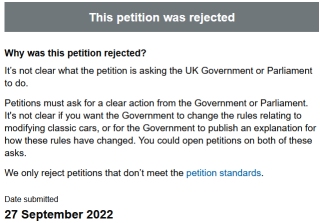Petition
seeking the relaxation of vehicle registration rules for electrifying
classic cars
An extraordinary petition was made under the UK Government and Parliament
"Petitions" procedure seeking "New rules for electrifying
classic cars, without the need to re-register or undergo an IVA,
should be introduced. The new rules should allow safe modifications
to enable electrification without requiring an IVA". The
petition was rejected as it was considered not to have met the petition
standards.
What is an IVA?
Individual Vehicle Approval (IVA) is the process of approving each
individual vehicle against national technical requirements. The standard
approach to this is to inspect each vehicle and more information on
this route to approval can be found here.
Posted: 221025 |
 |
Petition
seeking the relaxation of vehicle registration rules for electrifying
classic cars
In seeking
the introduction of new vehicle registration rules for electrifying
classic cars the petioners say "we
believe current vehicle registration rules are operating as
a barrier to the electrification of classic cars, because they
are being required to be re-registered and undergo an IVA.
New rules for electrifying classic cars, without the need to
re-register or undergo an IVA, should be introduced.
The new rules should allow safe modifications to enable electrification
without requiring an IVA. The
rules should apply retrospectively, with a right of review for
cases where classic cars had their registrations removed following
modification". Petition
Posted: 220923
Comment: DVLA take the position that a substantial change
to a vehicle means that it is no longer the same vehicle and
therefore requires re-registration. Changing it to electric
power is clearly a substantial change. |
 |
Why
was this petition rejected?
The Government website says "It’s not clear what the
petition is asking the UK Government or Parliament to do. Petitions
must ask for a clear action from the Government or Parliament.
It's not clear if you want the Government to change the rules
relating to modifying classic cars, or for the Government to
publish an explanation for how these rules have changed. You
could open petitions on both of these asks. We only reject petitions
that don’t meet the petition
standards."
The rejection
was posted on the UK Government and Parliament "Petitions"
website on 27th September 2022.
Posted:
220927 |
 |
FIVA
position on electification of Historical Vehicles
See their position
paper.
We understand FBHVC is following the FIVA position that vehicles
converted to electric power are no longer historic vehicles.
|
Background
An increasing number of individuals and companies ranging from
specialist shops to large vehicle manufacturers are offering
electrified vehicles for sale using historical vehicles as donors
and exchanging the whole drivetrain into an electric unit with
batteries to fuel the unit. This way it is possible to keep
the classic appearance of the vehicle while meeting modern environmental
expectations and standards. It may also incidentally increase
the power available for the owner. Some of the manufacturers
have even managed to get an approval for keeping the original
Vehicle Identification Number (VIN) of the donor vehicle despite
more or less changing the whole chassis.
Impact on the historic vehicle movement
Conversion of historical vehicles from their original internal
combustion engines to electric power does not comply with the
FIVA definition of a historic vehicle, cannot be carried out
in accordance with the Charter of Turin, and does not truly
achieve the goal of preserving historical vehicles. Vehicles
so converted cease to be historic vehicles, except for “in
period” changes.
FIVA’s Position
According to FIVA, a historic vehicle is "a mechanically
propelled road vehicle”:
• which is at least 30 years old,
• which is preserved and maintained in a historically correct
condition,
• which is not used as a means of daily transport
• and which is, therefore, a part of our technical and
cultural heritage
FIVA’s three main goals and objectives include:
• Protecting historic vehicles by ensuring that
the development of national and international legislation
does not create an adverse impact on owners of historic vehicles
and the use of these vehicles on public
roads without inappropriate restrictions
• Preserving historic vehicles, related artifacts
and records, including research and cataloguing to ensure
their continued enjoyment
• Promoting historic vehicle culture, including
international events, forums, and seminars.
FIVA does understand
the motivation of some owners to electrify their vehicles and
acknowledges that, subject
to legislation and regulation, all modifications are a matter
of personal choice. However, given the above, FIVA cannot promote
to owners or to regulators, use of modern EV components (motors
and batteries) to replace a historic vehicle powertrain. If
any owner, motor engineeer or manufacturer wishes to make such
conversions to historic vehicles, FIVA
would recommend that any vehicle changes are reversible with
all the original components marked and stored safely. So that
the vehicle may in future, if desired, be returned to its original
state and again become a historic vehicle.
See
a copy of this position paper
Posted: November 2021 |
|





